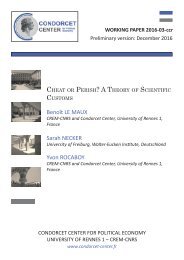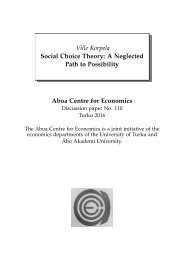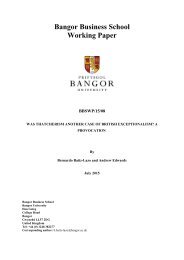MEMORANDUM
n?u=RePEc:hhs:osloec:2016_018&r=hpe
n?u=RePEc:hhs:osloec:2016_018&r=hpe
You also want an ePaper? Increase the reach of your titles
YUMPU automatically turns print PDFs into web optimized ePapers that Google loves.
process was delayed. In September 1928 Leontief wrote to the Dean of the Philosophical<br />
Faculty to ask for extension of the deadline as the dissertation would not appear in print<br />
until 1 December 1928.<br />
The Philosophical Faculty granted the extension. But two months later, in November<br />
1928, Leontief was forced to ask for an additional postponement of one month until 1<br />
January 1929. The dissertation had been published as Leontief (1928) but the required<br />
number of offprints could not be provided by the publisher until the latter date. The<br />
Faculty accepted, exceptionally, to proceed with Leontief’s promotion on 19 December<br />
1928 even though printed copies might not arrive at the Dean’s office until 1 January 1929.<br />
At the end of 1928 Leontief had worked for one year at the Kiel Institute. He became<br />
pressured for time for reasons which will be apparent below and decided at a rather late<br />
stage not to go to Berlin for the Promotion. He sent on 18 December 1928 a telegram to<br />
the Faculty: “Please proceed with promotion in absence – I am prevented from coming.<br />
Leontief.” Adolph Löwe, Leontief’s head of department, corroborated: “…for urgent<br />
reasons of completion of a scientific research project he cannot be given leave until the end<br />
of the year.”<br />
The Philosophical Faculty accepted the “urgent reasons” and sent the diploma in the<br />
mail after Leontief had submitted in writing the solemn vow of Promotion: “I engage<br />
myself to guard the honor the Faculty today awards me from any blemish and<br />
henceforth … to pursue truth alone, without respect for any external concerns. Kiel, 24. Jan.<br />
1929, sgn. Wassily Leontief”.<br />
The Kiel years 1928-1931<br />
Bernhard Harms had been director of the Institut für Seeverkehr und Weltwirtschaft in<br />
Kiel since it was founded in 1914. 106 The Kiel Institute was affiliated with Kiel University<br />
but not part of it. Its mission was to study the world economy. At the time it may have<br />
been the only institute in the world with this overall specialization. The Kiel Institute early<br />
achieved a reputation for its research in international economics and had attracted a number<br />
of highly qualified scholars, some with interests in other matters than sea transport and the<br />
world economy. The Institute published Weltwirtschaftliches Archiv, which had become a<br />
leading German language economics journal, highly regarded internationally. The journal<br />
served as a conduit for promoting research conducted at the Institute. Bernhard Harms had<br />
established a research library which at the time when Leontief arrived reputedly was the<br />
world’s largest economics library.<br />
106 Seeverkehr was dropped from the Institute’s name in 1934. Today the official name is the Kiel<br />
Institute of World Economy.<br />
39





